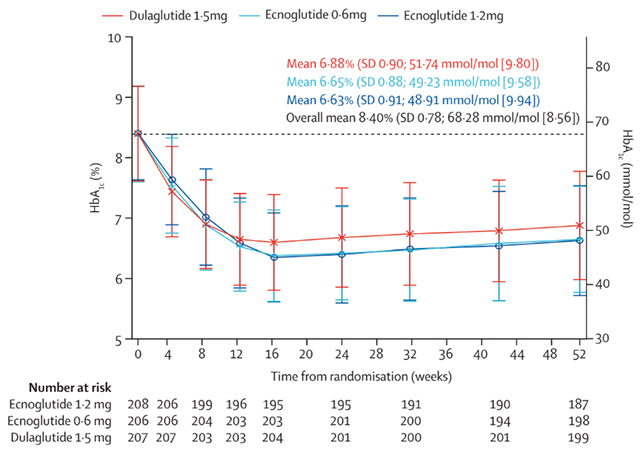Under brand names like Ozempic and Wegovy, semaglutide-based medications have made a significant difference in treating type 2 diabetes and obesity.
After a successful phase 3 trial, a new kind of treatment based on the same mechanics could deliver even more impressive weight-loss results.
Like semaglutide, the new drug known as ecnoglutide is glucagon-like peptide-1 receptor agonist. In simple terms, they both mimic the body's natural GLP-1 hormone, helping boost insulin production, reduce appetite, and slow digestion to throttle blood sugar levels.
Related: Something Inside Your Gut Could Be Like a Natural Ozempic
In a recent trial run by researchers from China, ecnoglutide performed as well as, or even better than, another GLP-1 treatment called dulaglutide.
What may give ecnoglutide an extra edge is that it's engineered to activate a specific route called the cAMP pathway – key to the benefits of GLP-1 – without touching other chemical circuits in the body. Current drugs, including dulaglutide, don't focus on the cAMP pathway as exclusively as ecnoglutide does.
"These results suggest that ecnoglutide might offer a new treatment option for type 2 diabetes," write the researchers in their published paper.

The trial involved 621 participants aged between 18 and 75, who had been diagnosed with type 2 diabetes and were already on the first-line medication metformin. The volunteers were asked to take doses of either ecnoglutide or dulaglutide once a week, over the course of a year.
Both types of treatment lowered blood sugar levels to a similar degree, but on average the participants on ecnoglutide lost almost twice as much weight as those on dulaglutide. Based on these results, ecnoglutide could be the more effective option of the two, even with a smaller dose.
The researchers also predicted ecnoglutide may be easier and cheaper to make than GLP-1 drugs that are currently on the market. Side effects included nausea and diarrhoea in some volunteers, but these tended to ease over time.
"Apart from glycaemic effects, both doses of ecnoglutide induced statistically significantly greater reductions in bodyweight, waist circumference, hip circumference, and triglycerides, all of which are cardiovascular risk factors, than dulaglutide," write the researchers.
Future investigations may compare ecnoglutide directly against semaglutide, and involve bigger and more diverse groups of people. Trials could also test the drug's results when combined with other anti-diabetic medications.
As a relatively novel class of treatment, GLP agonists continue to attract scrutiny for both beneficial and damaging long-term effects, including pancreas problems and vision issues.
While studies highlight potential alternative approaches to GLP-1 medications, the success of drugs like Wegovy drives pharmaceutical companies to focus on identifying improved versions of the treatments already being used – of which ecnoglutide might be one.
"These results suggest that ecnoglutide might help to address certain unmet needs in type 2 diabetes management and represent a potential advance in diabetes therapy," write the researchers.
The research has been published in The Lancet Diabetes & Endocrinology.
